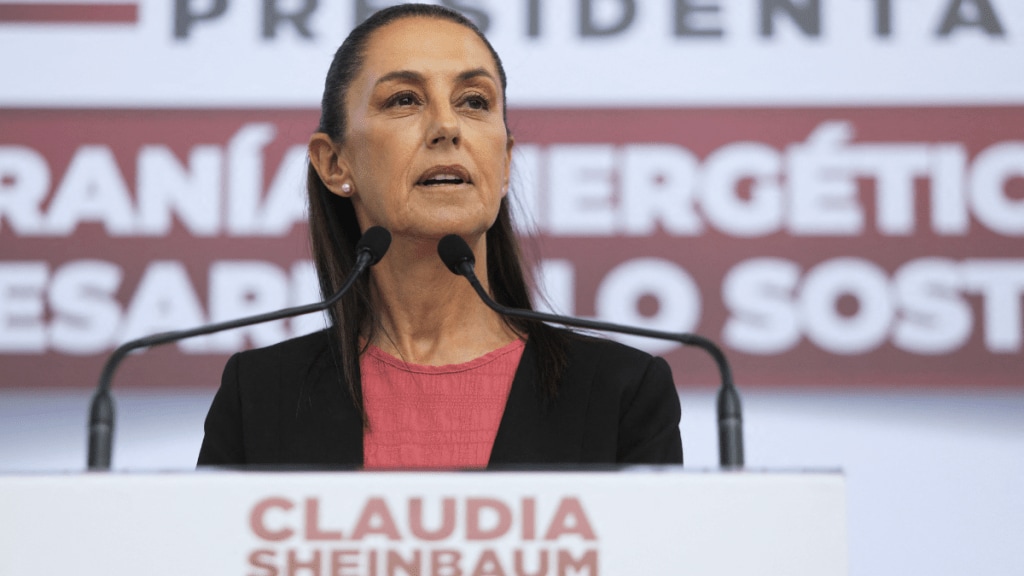In the midst of Mexico’s largest-ever elections, Claudia Sheinbaum emerges as the frontrunner in the race for the presidency, poised to potentially make history as the country’s first female head of state. As the campaign unfolds and June 2 approaches, when millions of Mexicans will cast their votes, the spotlight is on Sheinbaum and the transformative potential of her candidacy. If elected she will hold the office of the president for six years.
“In an unlikely turn of events, a country like Mexico that runs, breathes, and eats machismo, the Mexicans have to pick between two women who have become front runners in the Presidential elections,” says foreign policy analyst.
“This would be the first time that Mexico elects a woman as a President, while this is not the first time that a woman holds the President’s chair in Latin America, it is certainly a first for Mexico,” explains Dr Aparaajita Pandey, Ph.D. from Centre for Latin American Studies, Jawaharlal Nehru University.
So far (May 6, 2024) Sheinbaum is leading with 59 points and one of the reasons for it is her political career as the Mayor of Mexico City. Sharing her views with Financial Express Online, Dr Pandey says: “Sheinbaum is not just the first woman but also the first Jewish individual to be the Mayor of Mexico City. She is not only a politician but also an environmental scientist and has been a student activist throughout her academic career.”
What are some challenges the woman candidate is likely to face in case she wins?
In Dr Pandey’s view, “She would carry on with the populist left of centre legacy of Lopez Obrador, the current President. It would not be farfetched to argue that a woman President should translate into more social capital for women in society.”
Also, “Mexico is plagued with gender-based crimes and women face gender-based violence and discrimination to an extent that it has been regularised and accepted in society. Hopefully this would take a turn for the better,” she opines.
What about Mexico-US Relations?
“The US, the Mexican neighbour to the north, should also prepare itself for negotiations and dealing with a woman President. While it is an accepted reality in numerous countries around the world, the US has had problems with women in seats of power for a long time and with the tumultuous relationship that US and Mexico have, it would be interesting to see how they find the rhythm that works for both US and Mexico,” she opines.
All you want to know about the elections in Mexico
These elections will be the largest in Mexico’s history and for the first time, a woman could be selected to lead the country for the next six years.
The upcoming 2024 presidential elections in Mexico herald a pivotal moment in the nation’s democratic journey. On June 2, millions of Mexican citizens will exercise their right to vote, casting ballots not only for a new president but also for members of the Chamber of Deputies, the Senate of the Republic, eight governors, Mexico City’s Head of Government, and representatives in 31 local congresses. This electoral process, encompassing a wide array of positions, underscores the vibrancy of Mexico’s democratic system.
The official campaign started on March 1, 2024. There are three candidates competing for the presidency — Claudia Sheinbaum, Xóchitl Gálvez, and Jorge Álvarez Máynez.
Who will succeed Mexican President Andrés Manuel López Obrador?
Not until June 2, 2024 elections will it be clear who will replace Mexican President Andrés Manuel López Obrador.
Let’s Keep Making History (Seguimos Haciendo Historia), led by former Mexico City Mayor Claudia Sheinbaum is the frontrunner for López Obrador’s governing Morena coalition.
She is facing Senator Xóchitl Gálvez of the Strength and Heart for Mexico (Fuerza y Corazón por México). This is the main opposition alliance and has the Party of the Democratic Revolution (PRD) and the National Action Party (PAN), the Institutional Revolutionary Party (PRI).
Last December, Nuevo León Governor Samuel García of the Citizen’s Movement (Movimiento Ciudadano/MC) party, withdrew his candidacy. And his campaign coordinator, Jorge Álvarez Máynez, a federal deputy, announced his candidacy.
What distinguishes these elections is not only their scale but also the profound challenges awaiting the incoming administration, set to take office on October 1, 2024. The truncated transition period, with inauguration day moved forward by two months from the traditional December 1 date, adds urgency to the task at hand.
According to Wilson Center’s Mexico Institute, as the new leadership assumes office, they will confront a gamut of pressing issues demanding immediate attention and strategic planning. Among these, six key areas stand out: energy policy, migration management, nearshoring initiatives, security concerns, the implementation of USMCA, and water resource management. Each of these issues holds significance not only for Mexico internally but also for its bilateral relationship with the United States and the well-being of citizens on both sides of the border.
As presidential candidates and their campaign teams prepare for the elections, these issues loom large on the national agenda. The decisions made by the incoming administration will not only shape Mexico’s trajectory in the years ahead but also resonate across the North American region.

